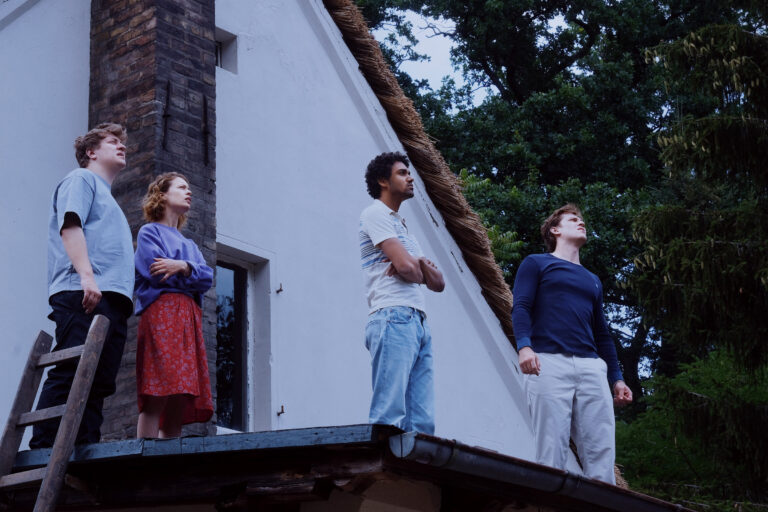Afire (2023 | Germany | 103 minutes | Christian Petzold)
We meet twentysomething friends Leon and Felix, just as their working holiday home gets off to a rough start. Getting away from city life to focus on creative pursuits, their Benz stops firing correctly, breaking down a rustic lane, out of cell service, in the middle of a forest. Felix optimistically runs ahead to find a path, leaving Leon alone in the woods to stew over this inconvenience. It’s a portentous beginning, and a pattern that will repeat itself often in their time by the coast in German director Christian Petzold’s take at a “summer film”.
After dispiritedly hauling their luggage through the forest, they arriving at Felix’s family vacation home to find a mess. The plot has again thickened: Felix’s mom also told a colleague from work that she could stay there for the summer. Felix takes it in stride, Leon again sulks at having to share the place with a stranger and to be stuck sharing a room. The indignity of this apparently free vacation spirals further for Leon, when, that night in cramped twin beds and a house with thin walls, he’s awakened by the sounds of their mysterious housemate enjoying some vigorous sex the next room over. By the time morning breaks, she’s bicycled off to town without saying hello.
Thomas Schubert plays Leon as a large man who has perhaps never been comfortable even once in his life. Perpetually annoyed by something, the stress of finishing his second novel plagues his every waking moment. Langston Uibel’s Felix is also facing a deadline: the completion of a photography portfolio to apply for art schools. He’s lithe and athletic, perpetually relaxed and able to go with the flow, allowing his days to be structured around swimming at the nearby seashore, waiting for inspiration to strike, and puttering around with maintenance tasks that arise with his family’s house. Quickly settling on a photography project, he passes his days bouncing between the house and shore. His absence leaves Leon with hours alone to torture himself with writing, to grow indignant at his friend’s seemingly carefree nature, to observe others from a distance, all while a chorus of insects buzz in the warm summer air.
Eventually, the third party makes an appearance in the form of Nadja, played with beguiling candor by frequent Petzold collaborator Paula Beer (who starred in both Transit and Ondine). She’s curious and good natured, interested in the guys, but Thomas remains steadfastly incurious about anyone other than himself. His game of avoidances and unmet glances similarly delays the audience from learning much about her. Instead, Felix befriends her, as well as the hot lifeguard she was sleeping with (Devid, Enno Trebs) who then becomes a frequent daytime companion, further isolating Leon as he anxiously awaits a visit from his editor. When he does pay a visit to the beach with his friend, he’s head-to-toe in black baggy clothes, immediately falling asleep on the sand and risking sunburn. In town, he sticks his foot in his mouth with almost every interaction. Joining dinner parties, he’s visibly irritated whenever he’s not the center of attention. It could be a thankless role, but somehow Schubert approaches it with extremely dry humor to offset the palpable cringe.
Petzold sets his film by the Baltic sea (where he’d previously shot Barbara), which Petzold has described as “where melancholic, sentimental men stare at the water and think about themselves” and has infused it with some self-critical autobiographical details of the “neuroses of a struggling artists”. Leon’s forcing his way through the writing of what seems like a pretty awful novel called Club Sandwich; Petzold reflects on his second overreaching film called Cuba Libre. The isolated setting and the comings and goings at the holiday cottage make for a kind of chamber piece that was (perhaps unsurprisingly) gestated while feverish with Covid-19, recovering with an Éric Rohmer box set, and with a limited cast who could create their characters away from the real world.
Like his recent filmography, Afire has elements that induce a feeling of unreality or of the action occurring in a liminal space. Though they assure themselves that the sea air shields them, dangerous forest fires burn at the periphery, coming ever closer and creating a sense of impending claustrophobia. Petzold’s trusted cinematographer Hans Fromm uses the setting’s many angles and interior spaces to create a feeling of pervasive jealousy, webs of discomfort, and intrigue just around every corner. Shooting day-for-night, the evening scenes take on an especially dreamlike quality, particularly as flames are glimpsed on the horizon.
All of these elements combine to give the film the feeling of a well-polished short story quality to it, mostly for better, slightly for worse. As it builds to a conclusion with sexual, personal, and professional intrigue peaking, you can feel Petzold forever chasing the thrill of an ending as perfect as he had with Phoenix. He doesn’t quite get it here, but what he does pull together is nevertheless a satisfying, self-critical, and thought-provoking. Petzold and his talented cast conjure a prickly yet rewarding getaway, with textured characters, and a transporting story. It’s not necessarily the trip you want to take, but it’s exactly what you want from a rewarding summer read (or watch).
Afire arrives in Seattle theaters on July 28, including a run at SIFF’s Uptown
Image courtesy Janus Films.
This piece was written during the 2023 SAG-AFTRA strike. Without the labor of the actors currently on strike, the film being covered here wouldn’t exist. More information about the strikes can be found on the SAG-AFTRA Strike hubs. Donations to support striking workers can be made at the Entertainment Community Fund.



